Assad vows to 'do our part' on holding Syria ceasefire
World powers have thrown their weight behind the landmark truce as a way to bring an end to Syria's conflict
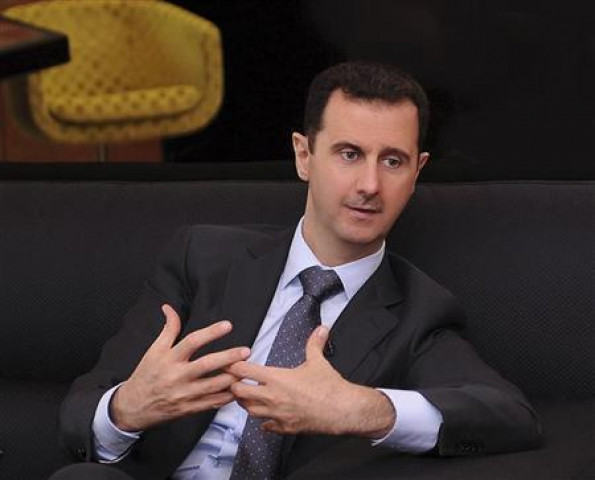
PHOTO: REUTERS
World powers have thrown their weight behind the landmark truce as a way to bring an end to Syria's conflict, which began in 2011 with anti-government protests.
Saudi accuses Russia, Syria regime of ceasefire violations
The United Nations said the next round of peace talks would resume in Geneva on March 9, announcing a two-day postponement "to allow adequate time to address logistical and practical matters".
Assad said the truce provided a "glimmer of hope" for Syria, where more than 270,000 people have been killed since the complex conflict erupted.
"We will do our part so that the whole thing works," Assad told German public broadcaster ARD, referring to the cessation of hostilities reached by the United States and Russia.
"We have refrained ourselves from retaliating in order to give (a) chance for the agreement to survive. That's what we can do, but at the end everything has a limit. It depends on the other side."
Assad also offered an amnesty to opposition fighters if they agree to disarm.
"The most important thing for me, legally and constitutionally... (is) that you're not allowed, as a citizen, to hold machineguns and hurt people or properties," he said.
"This is the only thing that we ask. We don't ask for anything. As I said, we give them full amnesty."
Guns fall silent in Syria
Hezbollah chief Hassan Nasrallah, whose Lebanese Shiite militants are fighting in support of Assad, also welcomed the ceasefire.
"We are happy with the truce and God willing it will persist and lead to a political solution," he said in Beirut.
The ceasefire has brought relative calm to swathes of territory in Syria's north, south, and around the capital, where civilians were back on the streets demonstrating against the regime.
In the besieged rebel town of Daraya, near Damascus, dozens of young men chanted against the government and carried signs reading "Daraya will not kneel!"
"Of course we're going to seize this opportunity (to protest) because the rest of the time there were constant barrel bombs and shelling," said activist Shadi Matar.
The truce does not include areas where the Islamic State group and al Qaeda's affiliate in Syria, al Nusra Front, are present.
Regime forces clashed Tuesday with IS militants in the oil-rich eastern province of Deir Ezzor, said the Syrian Observatory for Human Rights.
Clashes also took place in Aleppo city and in the town of Harbnafsa in central Hama province, said the monitor.
The complex patchwork of territorial control has made the truce difficult to monitor, particularly in areas where al Nusra Front has formed close ties with non-militant rebel groups.
Civilians in central Homs province say their towns are not being targeted as often, but violence has not stopped.
"There are much fewer airplanes, which is very good... (But) there's still artillery, mortar fire, and we hear the planes flying above us," said Hasaan Abu Nuh, an activist in the flashpoint town of Talbisseh.
"People still have the same routine -- they still go down to the shelters when they hear the planes."
Syria ceasefire begins under US-Russia deal
Despite backing opposing sides of Syria's war, Moscow and Washington drafted the UN-backed cessations of hostilities deal and co-chair the international task force evaluating its implementation.
Washington said Tuesday the ceasefire appeared to be holding, although State Department spokesman John Kirby noted that "nobody's doing any victory dances" yet.
"Over the last 24 hours, we have not been apprised of any claims of any additional violations of any significance," Kirby said, while noting there had been reports of violations in past days.
The opposition High Negotiations Committee however said there had been at least three violations by regime forces on Tuesday and 17 the previous day.
And Russia said Tuesday it had recorded 15 truce violations in the past 24 hours.
Foreign Minister Sergei Lavrov called for the closure of Syria's border with Turkey to prevent supplies reaching "terrorist" groups.
Tens of thousands of displaced Syrians amassed along that border last month, fleeing an intense government offensive backed by Russian strikes.
Speaking in Washington, top NATO General Philip Breedlove said Russia and Syria had turned the refugee crisis into a "weapon" against the West.
"Together, Russia and the Assad regime are deliberately weaponising migration in an attempt to overwhelm European structures and break European resolve," he told US lawmakers.


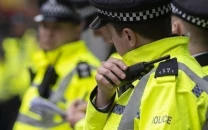

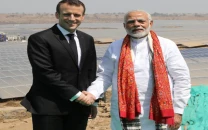
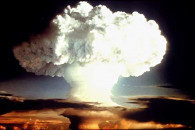
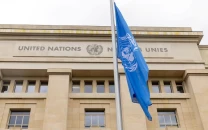












COMMENTS
Comments are moderated and generally will be posted if they are on-topic and not abusive.
For more information, please see our Comments FAQ